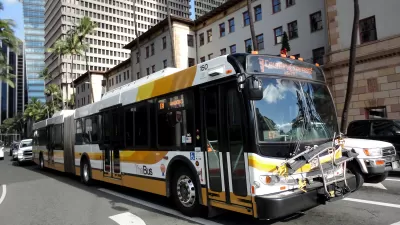The organization claims the standards used by cities are consistent and capture the most policy-relevant emissions.

On the heels of a study that indicated a broad underreporting of local greenhouse gas emissions by U.S. cities, ICLEI-USA (the U.S. chapter of Local Governments for Sustainability) has issued a press release rejecting the study's findings. "The GHG accounting method in the study is atypical in local GHG accounting, it is not fully comparable with city inventories, and does not address some of the key policy levers that drive cities to conduct GHG inventories and develop GHG mitigation strategies," ICLEI-USA claims.
The press release explains that the U.S. Community Protocol for Accounting and Reporting of Greenhouse Gas Emissions (USCP), an index used by many communities, "details science-based methodologies and best practices to guide local governments as they measure and report the GHG emissions and removals associated with their communities," highlighting the policy areas where local intervention has "the best opportunity" to reduce emissions and increase carbon sinks. "Local government practitioners developed community GHG accounting protocols to provide actionable results for decision makers and align with national inventories for multi-level collaboration. To imply that cities have erred in reporting emissions is misleading and does a disservice to the thousands of local governments doing their part to solve the climate crisis."
ICLEI is the developer of the USCP tool, which they say is "developed to provide local policymakers and their communities with the most appropriate understanding of how their community’s activities translate into GHG emissions." Using their standards, they claim, cities can get a better understanding of their role in GHG emissions and which policy decisions can make a real impact at the local scale.

Alabama: Trump Terminates Settlements for Black Communities Harmed By Raw Sewage
Trump deemed the landmark civil rights agreement “illegal DEI and environmental justice policy.”

Planetizen Federal Action Tracker
A weekly monitor of how Trump’s orders and actions are impacting planners and planning in America.

The 120 Year Old Tiny Home Villages That Sheltered San Francisco’s Earthquake Refugees
More than a century ago, San Francisco mobilized to house thousands of residents displaced by the 1906 earthquake. Could their strategy offer a model for the present?

In Both Crashes and Crime, Public Transportation is Far Safer than Driving
Contrary to popular assumptions, public transportation has far lower crash and crime rates than automobile travel. For safer communities, improve and encourage transit travel.

Report: Zoning Reforms Should Complement Nashville’s Ambitious Transit Plan
Without reform, restrictive zoning codes will limit the impact of the city’s planned transit expansion and could exclude some of the residents who depend on transit the most.

Judge Orders Release of Frozen IRA, IIJA Funding
The decision is a victory for environmental groups who charged that freezing funds for critical infrastructure and disaster response programs caused “real and irreparable harm” to communities.
Urban Design for Planners 1: Software Tools
This six-course series explores essential urban design concepts using open source software and equips planners with the tools they need to participate fully in the urban design process.
Planning for Universal Design
Learn the tools for implementing Universal Design in planning regulations.
Clanton & Associates, Inc.
Jessamine County Fiscal Court
Institute for Housing and Urban Development Studies (IHS)
City of Grandview
Harvard GSD Executive Education
Toledo-Lucas County Plan Commissions
Salt Lake City
NYU Wagner Graduate School of Public Service





























